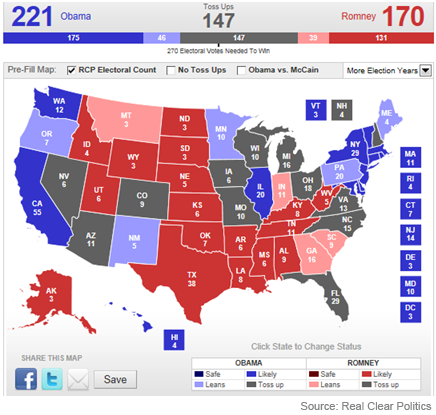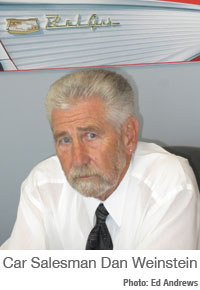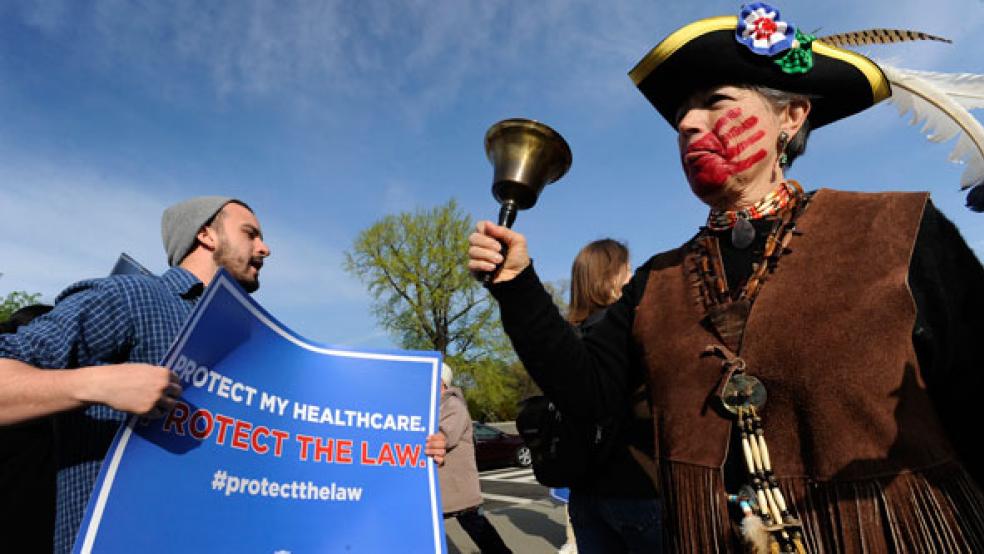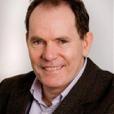“Fear,” says Tom Zawistowski, a small business owner in Columbus, Ohio, when asked why he is so passionately against the re-election of President Barack Obama. “Fear like you can’t believe. Fear like you’ve just gotten fired from your job and your wife is sick with cancer.”

Two years ago, Zawistowski was a political outsider. Today, he is president of the Ohio Liberty Coalition, a statewide tea-party group, and warns that Obama would carry out a massive government takeover of economy and destroy the United States as we know it. “If we see Mr. Obama get a second term, we will see the czars take over,” he warned over breakfast at a Bob Evans restaurant outside Akron, Ohio. Though genial and unfailingly polite, and often scathing about Republican leaders, Zawistoski spilled out his fears about octopus-like government in a torrent of words that became faster and more apocalyptic as he talked.
The president, he warned, had an “aggressive’’ agenda of government regulation and a “fantasy” belief in government stimulus; he would run up federal debt to the breaking point, ignore the Constitution and extend government control to every corner of life. “This is the tipping point,” he said. If we can stop this train right now, then maybe we can avoid disaster. This is a crisis of unbelievable magnitude.”
That kind of sweeping anti-government hostility, a hallmark of the tea party movement, is just one variant of the gut-level anger that disgruntled Americans are venting at President Obama. In interviews on a cross-country trip through many swing states -- Pennsylvania, Illinois, Ohio, Iowa and Nevada –dyspeptic voters accused the president of being elitist, arrogant, out of touch with ordinary people and ineffective at reviving the economy.

THE BUCK STOPS AT THE WHITE HOUSE
Anger toward the president – any president -- isn’t surprising at a time of persistently high unemployment and long-term unemployment. But it is not the whole story. Even among staunch conservatives in solidly Republican states, many people vented at least as much anger at Republican leaders at both the state and national levels. Indeed, many conservatives grudgingly acknowledged that they liked the president on a personal level – sometimes more than Republican Mitt Romney.
Democratic campaign officials have long worried that disillusionment among liberals and young voters, who played a big role in Obama’s 2008 victory, will hurt his 2012 campaign. But if the sentiments expressed by conservative voters reflect a broader pattern, Republicans may well have their own enthusiasm problem.
“I just can’t stand any more of him [Obama]. And it’s not just me. I’m hearing the same things from my friends in other states."
 “I didn’t vote for Obama last time, and I won’t vote for him this time, but I sure hate to vote for the other guys,’’ said Phillip Carroll, a retired Baptist minister in Des Moines who co-chaired an Iowa religious coalition to support John McCain’s presidential campaign. “To be honest, I think Republicans are touched in the head,” Carroll said. “I’ve gone to the party offices and tried to tell them, but they don’t listen.”
“I didn’t vote for Obama last time, and I won’t vote for him this time, but I sure hate to vote for the other guys,’’ said Phillip Carroll, a retired Baptist minister in Des Moines who co-chaired an Iowa religious coalition to support John McCain’s presidential campaign. “To be honest, I think Republicans are touched in the head,” Carroll said. “I’ve gone to the party offices and tried to tell them, but they don’t listen.”
As he spoke, Carroll was sitting with more than a half-dozen friends for breakfast at a diner in Des Moines. His companions included Larry Clark, a burly and bearded retired truck driver clad in a black leather vest, biker t-shirt and black hat.
Larry didn’t bat an eye as his daughter-in-law repeated the long-disproven charge that Obama had been born in Africa and wasn’t eligible to be president, and he accused Obama of coddling big banks and the rich. But he then he unexpectedly softened.
“I’d vote for him if he could find anybody to work with,” he said. “But if you don’t have Congress working with you, it don’t mean shit.” When asked if he felt sympathy for the president, Larry gulped hesitantly and said, “Yes.”
To be sure, visceral dislike for the president is apparent. Clark’s son Mike, a factory worker at the Bridgestone tire plant in Des Moines, even found himself complaining about Obama’s victories. Obama, he complained, had “grabbed all the credit’’ for the assassination of Osama bin Laden and groused about the president’s “double standard” of approving the assassination of bin Laden but supporting restrictions on guns for civilians.
IT’S THE STUPID ECONOMY
Many people blame Obama for their economic woes over the past four years. Robert Smith, a retired business manager from Schaumberg, Ill., blamed Obama for the drop in his home’s value – even though the housing market crashed before he became president. His wife Irene, who works in the school district’s administrative offices, blamed the president for the squeeze in her pay and pension benefits. “I just can’t stand any more of him,” she said. “And it’s not just me. I’m hearing the same things from my friends in other states.”
Yet what is striking from interviews with conservative voters in solidly Republican states, who might be expected to harbor deep resentment toward the president, is how little personal vitriol they vent. If anything, red-state Republicans vented more anger at their own party leaders – often accusing GOP leaders of being too polarizing and ideological.
"The two parties are all about protecting their own organizations and their own brands. We fight more with the Republicans than we do with the Democrats."
It’s become almost reflexive for Americans to heap scorn on both political parties and on Washington in general. Fewer than half of American voters identify themselves as either Republicans or Democrats.
Insurgent tea party groups, for all their Republican leanings, have defeated leading Republican incumbents in one primary after another. In the most recent upset, tea party activists in Indiana helped defeat Sen. Richard Lugar this spring. Recent polls by Pew Research also show that President Obama has a double-digit advantage over Romney on issues of personal character and likability, though voters favor Romney on the all-important issue of the economy.
Zawistowski, head of the Ohio Liberty Coalition, grudgingly supports Romney as the lesser of two evils. But he praised Obama for being both likeable as an individual and straightforward about his intentions. “I think he clearly believes what he says, and I think he is likeable,” he said. “I think his likeability may be his greatest strength.” 
By contrast, Zawistowksi scathingly accused the Republican establishment in both Ohio and nationally of being too willing to betray conservative principles. “There is no Republican party. The Republican Party doesn’t exist,’’ he declared. “We’re polarized because everything is about branding. The two parties are all about protecting their own organizations and their own brands. We fight more with the Republicans than we do with the Democrats.”
HOMES ON THE RANGE ARE STILL UNDERWATER
In Nevada, another swing state, Republicans in the gold-mining town of Elko express almost a mirror-opposite frustration. Unlike Las Vegas and Reno, which were devastated by the housing bust, Elko is booming because of soaring gold prices. Both housing and workers are in short supply. The local boom isn’t likely to help President Obama, because Elko voters are overwhelmingly Republican and reflexively oppose what they see as Democrats’ tendency toward tighter environmental restrictions over mining.
But it’s hard to find people who will speak harshly about Obama on a personal level. Elko’s Republican mayor, Chris Johnson, says Obama attracted big crowds when he visited the city in 2008 and would probably do so again. Johnson was more upset that state Republican leaders supported Rep. Ron Paul, the libertarian iconoclast who calls for abolishing the Federal Reserve.
“I’m not sure they’re representing Republicans in Nevada,” Johnson said. “There’s a vocal group that talks about no government and no taxes, but the people in Elko are closer to the center.” In Carson City, NV., the state capital, the housing market and the job market are still reeling from the housing crash and the Great Recession. The streets are still filled with vacant storefronts, payday lenders and other signs of economic woe.
 Yet Dan Weinstein, a 74-year-old car salesman at the city’s biggest Chevy dealership, says he likes the president. Weinstein worked at another Chevy dealership that General Motors was forced to shut down as part of cost-saving measures that the federal government demanded in exchange for bailout money in 2009. But he doesn’t blame Obama for the bad times.
Yet Dan Weinstein, a 74-year-old car salesman at the city’s biggest Chevy dealership, says he likes the president. Weinstein worked at another Chevy dealership that General Motors was forced to shut down as part of cost-saving measures that the federal government demanded in exchange for bailout money in 2009. But he doesn’t blame Obama for the bad times.
“I think Obama has done as good a job as you can expect,’’ Weinstein said. “I think a lot of the opposition to him around here is racist. I like him, and I think I’ll vote for him just because I feel sorry for him.”
Polls suggest that Obama will have a very tough time winning Nevada and other Republican-leaning swing states. But if he does lose, it won’t reflect the kind of all-or-nothing vitriol between the national political parties or between the rightwing pundits on Fox News and the leftwing pundits on MSNBC.
It is more likely to reflect a general skepticism and dismay by people like Jamie Leonard, the manager of an electrical parts wholesaler in Carson City. Like many Nevadans, Leonard opposes Obama’s health care reform and is dubious about the president’s penchant for federal regulation. But he doesn’t express any personal animosity toward the president and doesn’t subscribe to Republican orthodoxy against government intervention of any kind.
“It’s their job to legislate rules — we elected them to do that for us,’’ Leonard said. “The problem is that they seem to lose perspective on what we need as soon as they’re elected.”
Leonard, a self-described independent, says he won’t be voting for Obama in November. But he said it’s not because of personal animosity. Ever since his first presidential election in 1980, when he voted for Ronald Reagan, Leonard said, he has always voted against the incumbent.





